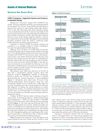 December 2022 in “Siriraj Medical Journal”
December 2022 in “Siriraj Medical Journal” The COVID-19 pandemic led to fewer patient visits, more visits by older adults, an increase in cutaneous T-cell lymphoma cases, and a rise in noncosmetic procedures at a dermatology clinic.
 44 citations,
January 2021 in “Dermatologic Therapy”
44 citations,
January 2021 in “Dermatologic Therapy” COVID-19 may cause hair loss due to infection stress or treatments.
 September 2024 in “Journal of Health and Rehabilitation Research”
September 2024 in “Journal of Health and Rehabilitation Research” COVID-19 is linked to temporary hair loss, especially in women.
 6 citations,
May 2022 in “Frontiers in Medicine”
6 citations,
May 2022 in “Frontiers in Medicine” The study suggests pandemic stress might worsen or trigger hair loss problems.
 22 citations,
October 2021 in “Dermatologic Therapy”
22 citations,
October 2021 in “Dermatologic Therapy” COVID-19 may cause temporary hair loss in some people.
 2 citations,
August 2021 in “Revista Da Associacao Medica Brasileira”
2 citations,
August 2021 in “Revista Da Associacao Medica Brasileira” The COVID-19 pandemic has increased hair loss and psychological distress in women.
March 2023 in “Civil Medical Journal” Androgenetic alopecia in Nepalese men often starts around age 29, with a possible link to COVID-19 worsening the condition.
 4 citations,
March 2023 in “Journal of the European Academy of Dermatology and Venereology”
4 citations,
March 2023 in “Journal of the European Academy of Dermatology and Venereology” COVID-19 can cause a temporary hair loss condition.
 5 citations,
January 2022 in “Journal of the European Academy of Dermatology and Venereology”
5 citations,
January 2022 in “Journal of the European Academy of Dermatology and Venereology” The Covishield COVID-19 vaccine caused skin-related side effects in 1.23% of the people vaccinated in the study from India.

COVID-19 can cause long-term lung, skin, and mental health problems, especially in women, people with other health issues, and those who had severe COVID-19.
 November 2021 in “Research Square (Research Square)”
November 2021 in “Research Square (Research Square)” The research found that COVID-19 survivors experienced long-term effects like anemia and hypertension, with age and gender being important factors, but race, income, and education had little to no impact.
 4 citations,
March 2021 in “International Journal of Dermatology”
4 citations,
March 2021 in “International Journal of Dermatology” COVID-19 and related stress may increase hair loss known as Telogen effluvium.
 88 citations,
October 2020 in “Open Forum Infectious Diseases”
88 citations,
October 2020 in “Open Forum Infectious Diseases” Some people who recover from COVID-19 continue to have symptoms like fatigue and cough for over 120 days, and some experience hair loss about 59 days after getting sick.
 11 citations,
May 2021 in “Journal of The American Academy of Dermatology”
11 citations,
May 2021 in “Journal of The American Academy of Dermatology” COVID-19 doesn't make alopecia areata worse.
 October 2022 in “Research, Society and Development”
October 2022 in “Research, Society and Development” Hair loss is a symptom of long COVID and can be treated with a protein-rich diet.
 April 2024 in “Clinical dermatology review (Print)”
April 2024 in “Clinical dermatology review (Print)” Most women aged 20-40 in the study lost hair diffusely and in volume over 6 weeks to 6 months, mainly due to telogen effluvium, often without a clear cause.
 March 2022 in “JAMA Dermatology”
March 2022 in “JAMA Dermatology” In 2021, JAMA Dermatology published significant findings on skin conditions post-COVID vaccination, melanoma surveillance, atopic dermatitis treatments, and confirmed that sun protection does not harm bone health.
 April 2021 in “Journal of Cosmetic Dermatology”
April 2021 in “Journal of Cosmetic Dermatology” The May 2021 issue of the Journal of Cosmetic Dermatology suggests injectables are becoming more reliable and may reduce the need for cosmetic surgery.
 January 2022 in “Clinical Cases in Dermatology”
January 2022 in “Clinical Cases in Dermatology” Stress can cause temporary hair loss, which usually gets better after the stress is gone.
 October 2024 in “JEADV Clinical Practice”
October 2024 in “JEADV Clinical Practice” UK dermatologists commonly use corticosteroids and minoxidil to treat hair loss conditions.
 January 2021 in “Journal of cosmetology & trichology”
January 2021 in “Journal of cosmetology & trichology” The treatment improved hair growth and thickness in patients with hair loss, even 10 months after therapy without additional products.
 January 2025 in “Cosmetics”
January 2025 in “Cosmetics” Astragalus sinicus extracts may help promote hair growth and treat hair loss.
 February 2024 in “Asian journal of medical sciences”
February 2024 in “Asian journal of medical sciences” Proper hygiene, adequate sleep, and self-care can reduce common skin diseases.
 10 citations,
April 2015 in “PubMed”
10 citations,
April 2015 in “PubMed” Rosemary oil and minoxidil 2% both effectively increase hair count in people with androgenetic alopecia, but rosemary oil causes less scalp itching.
 1 citations,
January 2023 in “Aesthetic surgery journal”
1 citations,
January 2023 in “Aesthetic surgery journal” Facial plastic surgeries and aesthetic procedures are becoming more popular in India, with a preference for non-surgical options and effective treatments for facial enhancement and hair loss.
 1 citations,
January 2023 in “IDCases”
1 citations,
January 2023 in “IDCases” A patient experienced severe hair loss after getting an mRNA COVID-19 vaccine.
 2 citations,
May 2022 in “JAAD Case Reports”
2 citations,
May 2022 in “JAAD Case Reports” A woman lost all her hair after mild COVID-19, but it started to regrow after treatment with a specific medication.
 213 citations,
December 2020 in “Annals of internal medicine”
213 citations,
December 2020 in “Annals of internal medicine” Many COVID-19 patients still have symptoms like fatigue and loss of taste or smell a month after diagnosis.
 737 citations,
August 2020 in “Journal of Infection”
737 citations,
August 2020 in “Journal of Infection” Many COVID-19 survivors experience long-term symptoms but still report satisfactory quality of life and return to work.
 June 2021 in “Aesthetic Cosmetology and Medicine”
June 2021 in “Aesthetic Cosmetology and Medicine” Some people lose a lot of hair after having COVID-19.




























